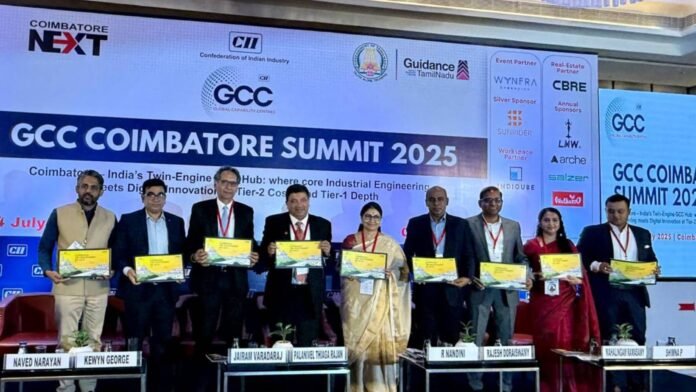Coimbatore: The Next GCC Hotspot in South India – A Deep Dive
For years, the narrative around India’s Global Capability Centres (GCCs) has been dominated by Tier-1 cities like Bengaluru, Chennai, and Hyderabad. These metropolises have traditionally served as the epicenters for multinational corporations establishing their offshore R&D, IT, and business operations. However, a significant shift is underway, and Coimbatore, often dubbed the “Manchester of South India” for its industrial prowess, is rapidly emerging as the next major GCC hotspot in the southern region. This transformation is driven by a unique confluence of factors: a robust industrial base, a burgeoning tech talent pool, significant cost advantages, and a highly supportive ecosystem that blends manufacturing strength with next-gen tech excellence.
A recent report highlights Coimbatore’s accelerated growth, outperforming many Tier-1 hubs with a 21% CAGR increase in new GCC setups over the past five years. Already home to over 60 GCC firms and employing more than 75,000 professionals, the city is not just attracting interest; it’s proving its mettle as a strategic hub for Core Industrial and Product Engineering R&D, alongside an expanding presence in cutting-edge software development and digital technologies.
The “Coimbatore Advantage”: A Strategic Blend of Factors
The rise of Coimbatore as a GCC powerhouse is not accidental. It’s the result of a deliberate evolution and a compelling set of advantages:
- Cost Competitiveness: Compared to gateway cities, Coimbatore offers significantly competitive real estate and operational costs. This includes lower rental rates for Grade A office spaces and more affordable living expenses for employees, translating into substantial savings for companies without compromising on quality or talent.
- Abundant and Quality Talent Pool: Coimbatore boasts a high literacy rate and a strong educational ecosystem, with numerous engineering colleges and universities producing over 100,000 graduates annually, including over 50,000 in STEM disciplines. This ensures a steady pipeline of skilled and trainable talent across digital, engineering, and emerging tech domains. The city also benefits from lower attrition rates compared to metros, offering talent stability.
- Industrial and Engineering Prowess: Unlike many pure-play IT hubs, Coimbatore has a deep-rooted legacy in core industrial sectors like automotive, aerospace, embedded systems, and precision engineering. This unique blend allows GCCs to focus on high-value work, including product engineering R&D, digital twin technologies, and smart manufacturing, seamlessly integrating physical and digital capabilities.
- Thriving Innovation and Startup Ecosystem: The city is witnessing a burgeoning startup culture with over 250 tech-enabled startups and 23 incubators. This vibrant ecosystem fosters innovation, provides agile partners for MNCs, and contributes to a dynamic and collaborative business environment. Startups in Edtech, Marketing & Sales, and Foodtech are particularly thriving.
- Robust and Developing Infrastructure: Coimbatore’s commercial office market is expanding, with 8-10 million sq. ft. of total stock. The city is actively developing its Grade A office footprint, attracting businesses with modern, often green-certified, workspaces. Furthermore, the Tamil Nadu government is actively supporting the city’s growth with major development projects, including a new TIDEL Park, an Integrated Jewellery Park, airport expansion, and significant road and water infrastructure upgrades. The recent establishment of a State Street Centre of Excellence in IndiaLand Tech Park further solidifies this trend.
- Government Support and Policies: The Tamil Nadu government is proactively fostering GCC growth through supportive policies, payroll subsidies, and initiatives aimed at attracting foreign direct investment (FDI). The focus is on creating an “ease of doing business” environment that extends beyond traditional metros.
Beyond Cost Arbitrage: A Hub for High-Value Work
Coimbatore’s appeal goes beyond mere cost arbitrage. It’s increasingly becoming a destination for high-value work and innovation. The city’s strong foundation in engineering and manufacturing, combined with its growing capabilities in AI, IoT, and digital twin technologies, makes it an ideal location for companies seeking to drive sector-specific R&D and product engineering.
GCCs in Coimbatore are evolving from basic support functions to strategic centers of excellence. Companies are leveraging the local talent and ecosystem to develop new products, software platforms, and even patents from their Coimbatore centers. This shift reflects a strategic move towards building multidisciplinary centers focused on innovation, resilience, and sustainable growth.
The Roadmap Ahead: Sustaining Momentum
While Coimbatore’s rise is undeniable, sustaining this momentum will require continued focus on several key areas:
- Infrastructure Upgrades: Continued investment in airport expansion, road networks, and urban planning will be crucial to prevent the congestion issues that plague larger metros.
- Talent Retention: While the city produces abundant talent, retaining it locally is key. The influx of high-quality GCC jobs directly contributes to reversing outward migration and bringing skilled professionals back to their home region.
- Academia-Industry Integration: Stronger collaboration between educational institutions and industries will ensure the talent pipeline remains relevant and future-ready, addressing the evolving needs of GCCs.
- Promoting Innovation: Continued support for the startup ecosystem, incubators, and R&D initiatives will ensure Coimbatore remains a hub for cutting-edge innovation, not just efficient operations.
Coimbatore is not merely replicating the Bengaluru model; it’s carving out a new blueprint for GCC expansion – one that is more balanced, resilient, and inclusive. For startup founders and established enterprises alike, its emergence offers a compelling case study in how Tier-2 cities can leverage their unique strengths to become global economic powerhouses. The city’s journey underscores a powerful message: strategic investment in talent, infrastructure, and a nurturing ecosystem can unlock immense potential, transforming regional hubs into global capability centers.



